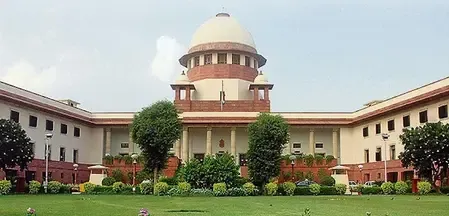Why Did the Supreme Court Adjourn the Bail Pleas of Umar Khalid and Sharjeel Imam?

Synopsis
Key Takeaways
- The Supreme Court has adjourned bail pleas for key defendants.
- The accused are charged under the Unlawful Activities (Prevention) Act.
- Evidence suggests a broader conspiracy behind the 2020 Delhi riots.
- Previous bail requests were denied by the Delhi High Court.
- The riots resulted in significant loss of life and injuries.
New Delhi, Sep 12 (NationPress) The Supreme Court has postponed the hearings regarding the bail applications of Sharjeel Imam, Umar Khalid, Meeran Haider, and Gulfisha Fatima -- individuals implicated in the conspiracy case surrounding the 2020 Delhi riots -- until next week.
A panel comprising Justices Aravind Kumar and N.V. Anjaria expressed challenges in addressing this collection of special leave petitions (SLPs), indicating that the documentation was circulated rather late the night before.
During the proceedings, the bench acknowledged that the defendants, charged under the stringent Unlawful Activities (Prevention) Act (UAPA), have contested the Delhi High Court’s decision to deny them bail. The Justice Kumar-led panel ordered that this batch of petitions be scheduled for hearing on September 19.
Previously, the Delhi High Court had rejected bail requests from several activists and student leaders linked to the alleged broader conspiracy behind the riots in North-East Delhi. In an order issued on September 2, a bench led by Justices Shalinder Kaur and Navin Chawla noted that there was substantial evidence suggesting that both Imam and Khalid orchestrated the conspiracy.
The bench led by Justice Kaur observed that both Khalid and Imam delivered incendiary speeches on February 24, 2020, coinciding with the visit of US President Donald Trump. The prosecution alleged that these speeches were deliberately timed to incite riots on February 23-24 and attract international attention.
"The purported inflammatory and provocative speeches made by the appellants, when viewed collectively, prima facie reflect their involvement in the alleged conspiracy," remarked the Delhi High Court.
Regarding Meeran Haider, the court highlighted allegations that she facilitated funding for the Alumni Association of Jamia Millia Islamia (AAJMI), where meetings of the JMI Coordination Committee (JCC) took place.
The Justice Kaur-led bench further noted that the prosecution’s claim that the investigation against Haider was complete did not represent a significant enough change in circumstances to warrant bail, citing ongoing witness examinations and the serious nature of the alleged conspiracy.
According to the prosecution, Gulfisha Fatima employed coded language to instruct protesters on actions related to the alleged conspiracy and received funds in connection with it. The riots in February 2020, triggered by protests against the Citizenship Amendment Act (CAA) and the National Register of Citizens (NRC), resulted in the deaths of 53 individuals and left over 700 others injured.









